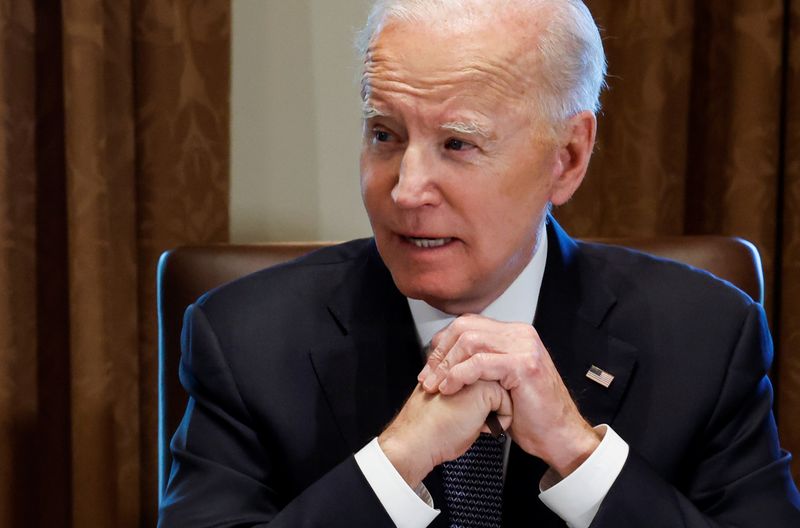
© Reuters. U.S. President Joe Biden speaks as he meets with Defense Secretary Lloyd Austin, Deputy Defense Secretary Kathleen Hicks and other military leaders in the Cabinet Room at the White House in Washington, U.S., April 20, 2022. REUTERS/Jonathan Ernst/ File Ph
By David Lawder
WASHINGTON (Reuters) – President Joe Biden’s proposed U.S. government budget would raise tax receipts by $4.951 trillion over 10 years, including more than $2.7 trillion in tax hikes on businesses and nearly $2 trillion on wealthy individuals and estates, the U.S. Treasury said on Monday.
The budget plan also calls for an additional $104.3 billion in mandatory funding for the Internal Revenue Service on top of $80 billion won by the tax agency in 2022, the Treasury said in its “Green Book” estimates of the budget’s revenue effects.
This additional funding would add $341 billion in new revenues over the 10-year period compared with current funding, the Treasury said.
The tax increases are part of Biden’s election-year budget wish list, which also includes new programs to assist low- and middle-income Americans with high housing and childcare costs and aims to cut the deficit. Congress is likely to discard the proposals, but the document forms a central campaign message for Biden.
PLUGGING SHORTFALLS
The Treasury estimated that reforms to international business taxation, driven by implementation of a 2021 global 15% minimum tax deal by 137 countries, would add $632.2 billion to U.S. receipts over 10 years. But even with the addition of a higher U.S. overseas minimum tax of 21%, this is well below last year’s estimate of about $1.16 trillion.
A U.S. Treasury official told reporters the reduction was due to revised assumptions that fewer countries would adopt the minimum tax apart from Britain, Japan, the European Union, Mauritius and Vietnam.
The reduction was made up elsewhere, including through an increase in the domestic large-company minimum tax to 21% from 15%, which the Treasury estimates would raise $137.4 billion over 10 years. It estimates that a new proposed ban on companies’ ability to deduct non-CEO and CFO employee compensation above $1 million would raise $271.9 billion over 10 years.
Elimination of tax breaks for fossil fuel energy companies would raise $45.1 billion in new revenues over the decade through 2034, while raising the overall corporate tax rate to 28% from 21% would raise $1.35 trillion, Treasury estimated.
TAX THE RICH
The Treasury estimated that provisions to raise taxes on wealthy individuals, new rules for estate transfers, and limiting high-income individuals’ use of tax-advantaged retirement accounts would raise $1.96 trillion.
That total includes Biden’s “billionaire tax,” which would impose a 25% minimum tax on individuals with wealth of over $100 million. The Treasury estimated it would raise $502 billion over the decade.
The Treasury again proposed more funding for the IRS to conduct more audits of wealthy individuals and complex business partnerships. The Treasury has recently increased its internal estimates of the revenues that could be collected from the IRS modernization efforts.
The budget also includes a number of new proposals to help Americans cope with the high cost of housing, including a $10,000 tax credit over two years to help offset high interest costs for first-time homebuyers and a one-time $10,000 credit for sellers of “starter homes” to increase market inventory.
Together these would cost $47.3 billion over the 10-year period, the Treasury said.
The budget’s overall tax proposals to assist moderate-income families, including the housing credits and expanded tax credits for children and health insurance premiums, would cost $764.9 billion over 10 years, the Treasury said.
Source: Investing.com




























